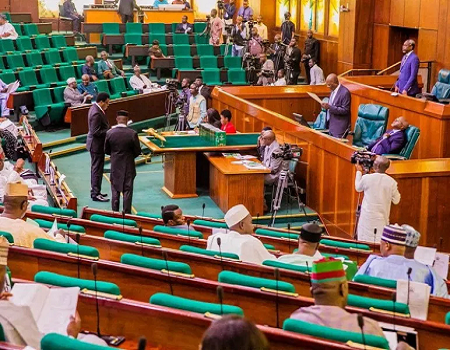The House of Representatives is set to consider a bill seeking to increase the derivation fund for states with mineral resources from not “not less than13 percent to not less than 50 percent.”
The proposed legislation, which is sponsored by Awaji-Inombek Abiante and eight others, is seeking an alteration of Section 162(2) of the 1999 Constitution (as amended).
The bill, which was slated for debate, at Wednesday’s plenary (that is today, October 23), was deferred to Tuesday next week to enable members to get copies of the proposed legislation.
Regardless, Abiante, in the legislative brief, said the 13 percent derivation fund currently in operation is “grossly inadequate and a mis-representation of the spirit of pre-independence negotiations and agreements.”
Consequently, he said there is an urgent need to increase the derivation fund from “not less than 13 percent” to “not less than 50 percent”.
“Even the intent and desire to ensure the rehabilitation and development of the damaged environment where mineral resources (liquid, gaseous and solid) are derived for the sustenance and development of the whole country does not also seem achievable with the current practice of 13%,” Abiante contended.
“This Bill is not all about resource control but an attempt to address the myriads of issues bordering on the meager “not less than 13%” derivation fund payable to states on revenues derived from their environment as provided for in Section 162(2) of the 1999 Constitution of the Federal Republic of Nigeria as (amended).
“It is important to state that this amendment is not only relevant for today but also for the future. Some of us may feel that this section that we seek to amend makes no sense to them, because their states are not presently affected but it is pertinent to ask, what about the future?”
He added: “Let us remember that every state in the Federal Republic of Nigeria is blessed with abundant natural resources capable of turning the economic fortunes of the country. The increased interest by the Federal Government to reduce the dependence on oil and gas as the mainstay of our economy means attention will be shifted to the solid minerals.
“The huge environmental impacts of the exploitation of natural resources on the host communities are devastating. These include but are not limited to:
Pollution: Pollution of the environment, through oil spills in the case of oil exploitation and the destruction of the soil in the case of solid mineral exploitation. This means the destruction of the means of livelihood of the people.
“The incessant oil spills in the Niger Delta that sometimes culminate to serious fire incidents that destroy lives and property including farmlands. The sea and water resources are not spared either. The destruction of the environment in areas where solid minerals are mined has also affected the means of livelihood of the people.
“The spiral effects of loss of livelihood like hunger leads to other social vices and organized crimes
Insecurity and youth restiveness .The effects of insecurity and youth restiveness are better imagined than discussed here.
“The meager ‘not less than 13% ‘ derivation as presently provided for by the 1999 Constitution of the Federal Republic of Nigeria encourages Illegal exploitation and mining of our natural resources.”



























